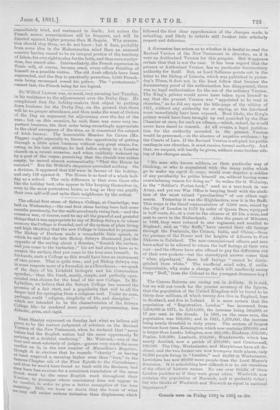A discussion has arisen as to whether it is lawful
to read the Revised Version of the New Testament in churches, as if it were an Authorised Version for this purpose. But it appears certain that that is not the case. It has been argued that the present or Authorised Version has no particular documentary authority for itself. But, as Lord Selborne points out, in the letter to the Bishop of Lincoln, which was published in yester- day's Times, it does not in the least follow that because the documentary proof of the authorisation has disappeared, there was no legal authorisation for the use of the ordinary Version. The King's printer would never have taken upon himself to say that the present Version was " appointed to be read in churches," as he did say upon the title-page of the edition of 1611, without any authority for so saying, as the falsehood must immediately have been exposed. Most likely, the King's printer would have been brought up and punished by the Star Chamber at once, for such an offence,—which, indeed, he would never have dared to commit. At all events, a legal justifica- tion for the authority accorded to the present Version would be presumed,—in the absence of negative evidence,—by the Courts of Law, If the Revised Version is adopted for public roadingin our churches, it must receive formal authority. And that, we suspect, will hardly be given, without some further sift- ing of the changes made.


































 Previous page
Previous page